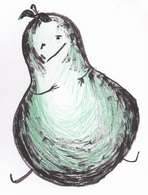A Fruitful Tale
By
S. L. Woodford
Illustrations by Jenny Blair
By
S. L. Woodford
Illustrations by Jenny Blair
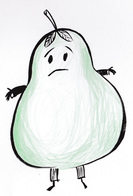
Toupee von Pear was glad. He and his clan lived a charmed life, hanging from the sturdy branches of Mr. Schleiermacher’s prized pear tree. There, sheltered by its wide leaves, they did not fear the beak of the hungry bird or the gusts of the trundling wind. And every night, Owl visited them. Sitting on his usual branch, straight and unmoving, he would tell to them stories of their fate.
“You are lucky,” he would hoot. “You are the pears Mr. Schleiermacher makes into ambrosia.”
“How? How will he make us into ambrosia, Owl?” Even though Toupee and his clan knew, it was always lovely to hear the story once more.
“If you listen,” replied the Owl, “I shall tell you: When the nights become cold and your skin is green and soft, Mr. Schleiermacher will come to you with his ladder and basket. With the same large hands he uses to test your ripeness, he will pluck you from your branch and put you in his basket. Then, he will put his basket in his truck and drive to the town’s Juicery—renowned for its delicious juices, beloved by the King.”
“And then what happens?” the pears would ask, for this was their favorite part.
“And then, Mr. Schleiermacher will put you in a press and squeeze you, your yellow-green skin parting and your juices becoming one. You will be ambrosia, the sweetest of liquids, the sole breakfast drink of the King.”
His story now done, the Owl would ruffle his feathers and fly away. His dinner would not catch itself. For a few moments, the pears would keep silent, imagining what it would be like to become one with each other, to become something only fit for the lips of a King. Toupee, nestled in his patch of leaves, would let the memory of the Owl’s words enfold him: “You will be the sweetest of liquids, the sole breakfast drink of the King.”
What a pleasant thought to fall asleep to.
One evening, just as the nights began to grow colder, a soft sigh awakened Toupee from his sleep.
"Oh, you will do very nicely," a gentle voice said.
A calloused hand reached out and began to pull Toupee from his branch, his stem snapping away, without much effort.
"Toupee! Toupee! Toupee!" his clan called. "Where are you going? That is not Mr. Schleiermacher. We aren’t ready for the harvest."
"I don't know,” Toupee called back. “But I don't want..."
Whatever Toupee had not wanted was lost to his clan; the wind took away his words as the woman climbed down the tree. At the bottom, his kidnapper stopped, cocked her head, and ran her fingers around him. Toupee trembled, her touch, though light, scraped across his skin. He couldn’t afford bruising. He must be perfect for the harvest. The women leaned over him—and her breath, warm and heavy from the climb, blew across him.
“Lovely,” she said, “absolutely lovely.”
She put Toupee into her coat pocket and began to run.
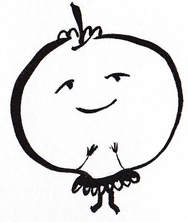
“Where was he?”
Toupee opened his eyes. Despite his fears, he had gotten sleep in the woman’s dark pocket. He was on a window sill, opened to the outside world. Toupee felt the hot sunlight, tumbling from the sun overhead, directly on his skin. Always shaded by branches and leaves, he had never felt the sun so intensely before. He looked out the window. Standing on a distant hill was Mr. Schliermacher’s pear tree, tall and full. Toupee closed his eyes and tried not to be sad.
“The sun feels nice, doesn’t it? But by the by, I do hope that she puts us back in the icebox soon. I’m far too young to prune.”
Toupee looked to his left. He wasn’t alone on the window sill. There, a few feet away sat a sumptuous, purple plum.
The plum smiled. “Oh forgive me, where are my manners? I’m Peabody von Plum. And, on behalf of the other fruits, I would like to welcome you to the bowl.”
“The bowl?” Toupee looked around him more closely. Yes, he was on a window sill, but, also in a bowl, a bowl of deep cobalt blue, bluer than the summer sky.
As Peabody’s surname suggests, he came from a high pedigree of fruits and knew how to be the perfect of hosts. “Would you like me to introduce you to the others?” he asked.
Toupee did not want to be introduced to the others. He wanted to be back up in the pear tree. Yet, Peabody was being kind, and he didn’t want to seem rude.
“If you would like. I would not object.”
Toupee saw that a group of creatures was beginning to cluster around Peabody, colorful , and bright in the high noon sun. An apple, small and pink, rolled over to meet him.
Toupee opened his eyes. Despite his fears, he had gotten sleep in the woman’s dark pocket. He was on a window sill, opened to the outside world. Toupee felt the hot sunlight, tumbling from the sun overhead, directly on his skin. Always shaded by branches and leaves, he had never felt the sun so intensely before. He looked out the window. Standing on a distant hill was Mr. Schliermacher’s pear tree, tall and full. Toupee closed his eyes and tried not to be sad.
“The sun feels nice, doesn’t it? But by the by, I do hope that she puts us back in the icebox soon. I’m far too young to prune.”
Toupee looked to his left. He wasn’t alone on the window sill. There, a few feet away sat a sumptuous, purple plum.
The plum smiled. “Oh forgive me, where are my manners? I’m Peabody von Plum. And, on behalf of the other fruits, I would like to welcome you to the bowl.”
“The bowl?” Toupee looked around him more closely. Yes, he was on a window sill, but, also in a bowl, a bowl of deep cobalt blue, bluer than the summer sky.
As Peabody’s surname suggests, he came from a high pedigree of fruits and knew how to be the perfect of hosts. “Would you like me to introduce you to the others?” he asked.
Toupee did not want to be introduced to the others. He wanted to be back up in the pear tree. Yet, Peabody was being kind, and he didn’t want to seem rude.
“If you would like. I would not object.”
Toupee saw that a group of creatures was beginning to cluster around Peabody, colorful , and bright in the high noon sun. An apple, small and pink, rolled over to meet him.
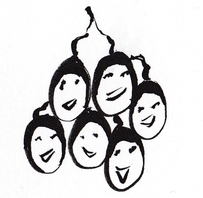
“Hello,” she said, “I am Alice the Apple.”
He then saw a great, green prickled thing, looming behind Peabody. “Greetings,” it shyly said, “I’m Alasdair the Artichoke.”
“Hello!” chorused a bunch of purple grapes. “We are the Sextuplets.”
“All of you are fruit?” Toupee was used to only being around pears.
“Yes,” sang the Sextuplets, “and who are you?”
“I,” said Toupee, “I am Toupee von Pear of Mr. Schilermacher’s tree.” He looked out the window again. “You can see it over there.”
“What a fine tree,” said Alice.
“Yes it is. A tree that I hope to go back to in time for the harvest.” He proudly looked at his strange audience. “I am to be made into the King’s ambrosia!”
The fruits were silent.
Peabody cleared his throat. “Toupee,” he said as gently as he could, “I fear that you will not be going back.”
He then saw a great, green prickled thing, looming behind Peabody. “Greetings,” it shyly said, “I’m Alasdair the Artichoke.”
“Hello!” chorused a bunch of purple grapes. “We are the Sextuplets.”
“All of you are fruit?” Toupee was used to only being around pears.
“Yes,” sang the Sextuplets, “and who are you?”
“I,” said Toupee, “I am Toupee von Pear of Mr. Schilermacher’s tree.” He looked out the window again. “You can see it over there.”
“What a fine tree,” said Alice.
“Yes it is. A tree that I hope to go back to in time for the harvest.” He proudly looked at his strange audience. “I am to be made into the King’s ambrosia!”
The fruits were silent.
Peabody cleared his throat. “Toupee,” he said as gently as he could, “I fear that you will not be going back.”
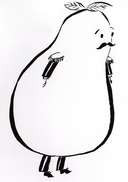
“What?” Toupee felt dread welling up in his core. “Why?”
“The Artist, the woman who took you from the tree, requires you.” Peabody glanced fondly at the others. “She requires all of us.”
“She wants to paint us!” cried the Sextuplets.
“I don’t want to be painted. I must become ambrosia for the King!”
“But you cannot go back,” Peabody said as Toupee felt the plum’s bulging form near him. “None of us can.”
Toupee leaned against the plum’s fleshy side. How he wished that the soft purple-black of Peabody’s skin was a clear summer night in the pear tree.
“But none of this seems fair!” Toupee sputtered.
“You are right,” replied Peabody. “It isn’t.”
“But you are also wrong,” said Alice.
“Artists,” chorused the Sextuplets, “are never fair.”
It seemed to Toupee that artists were rather cruel.
“The Artist, the woman who took you from the tree, requires you.” Peabody glanced fondly at the others. “She requires all of us.”
“She wants to paint us!” cried the Sextuplets.
“I don’t want to be painted. I must become ambrosia for the King!”
“But you cannot go back,” Peabody said as Toupee felt the plum’s bulging form near him. “None of us can.”
Toupee leaned against the plum’s fleshy side. How he wished that the soft purple-black of Peabody’s skin was a clear summer night in the pear tree.
“But none of this seems fair!” Toupee sputtered.
“You are right,” replied Peabody. “It isn’t.”
“But you are also wrong,” said Alice.
“Artists,” chorused the Sextuplets, “are never fair.”
It seemed to Toupee that artists were rather cruel.
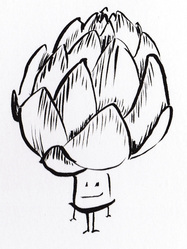
But, if artists were rather cruel and had a
penchant for unfairness, they also seemed to be rather efficient. As the month
unfolded, Toupee noticed that his days in the bowl stretched out before him
with a simple rhythm and regularity. Every morning, the artist came into the
room where the fruit waited in the ice box. She would open the door and take
them out, one by one, and gently position them in the large, cobalt bowl.
After putting the bowl by the open window, she would begin to sketch: first in pencil, then in charcoal, finally, in colored chalk.
When the fruits felt the afternoon sun warm their skin, she switched to paintbrush and canvas. The Artist would peer at the fruits with furrowed brow and paint until the sun went down. Then, smiling, she would cover the canvas with a white cloth, open the icebox, and gently put the fruits onto the top shelf—one by one—next to the marmalade and eggs. In the cool darkness of the icebox, the fruits would speak about their day.
“Ah, another day well done,” Peabody would chuckle.
“Goodness, I think she’s making us sit longer and longer,” complained Alice.
“If she keeps us in the sun too long, we’ll get all shriveled!” moaned the Sextuplets.
Alasdair would usually say nothing.
It was then the fruits would turn their conversation to other matters. Like Toupee’s clan, the icebox fruits enjoyed a good story. But unlike Toupee’s clan, the icebox fruits did not have the stories of Owl on those cold evenings, next to the eggs and marmalade. They only had their stories to tell each other, tales and memories of what they were before the bowl. In Toupee’s opinion, he thought Peabody’s story of his life before the bowl the most interesting, and the most puzzling.
“Please tell us again about your life before the bowl, Peabody,” Toupee would plead, when he thought enough time and stories had passed among the fruits since the plum had last shared his tale.
“Of course, Toupee, I shall do anything for you.”
Peabody closed his eyes and scrunched them, as if trying to remember the details of something long, long ago. The other fruits gathered around Peabody, except for Alasdair, on account of his spikes, but even he would lean in with interest. Peabody had a way with words.
“Once,” he’d begin, “once, I lived in the tree of the Lady Weaver, the finest creator of yarn and fabric in all the land. Every day, she would tend to me and my brothers and sisters, turning us over, checking the color of our skin, touching us with her fine long, fingers.”
Toupee closed his eyes, imagining the lady’s delicate touch. Sometimes, Mr. Schliermacher came to the pear tree and gave him and all of his clan a gentle squeeze, just to see that the sun was ripening them properly.
“The lady grew us for our skin, a key pigment for her purple dye, the one that colored the robes of the King. I, like my siblings, was destined to be skinned, squashed, and woven into a ceremonial cape—but the Artist changed that. One night, she climbed up the plum tree, picked me with her calloused hands, and ran home, carrying me in her coat pocket.”
Toupee thought of his clan, of Owl, of warm summer nights in Mr. Schleiermacher’s tree. “You will be the sweetest of liquids, the sole breakfast drink of the King,” he mumbled to himself. So much for Owl’s stories.
“Toupee? Do you have something to say? You’re mumbling to yourself again.”
“Forgive me, Peabody, I was thinking of my past. Your story always makes me think of my past.”
“I’m sorry that it does.”
“Please, don’t be. But, Peabody?”
“Yes?”
“Don’t you miss it?”
“No.” Peabody paused. “Though the Lady Weaver’s hands were delicate and fine, I never felt any warmth from their touch. I was one of many to her. And yes, the Artist’s hands are rough and smudged with charcoal, but they are warm and gentle. To her, I have always been myself.”
“Yourself?”
“Yes, myself. The Lady Weaver treated me well; but never took the time to see that I had a browner stem than my siblings. The Artist notices things like that.”
“Yes,” added Alice, “the Artist does notice things like that. I was a little too small and a little too pink to be an apple fit for a grocery store display. Yet, she saw my smallness and my pinkness and she chose me for it.”
“And even though we were too sour for wine, she thought we were good enough to paint!” shouted the Sextuplets.
Peabody turned, addressing the large, spiky green thing, which kept its distance but leaned in with interest. “What are you thinking, Alasdair?”
Alasdair, who usually said nothing, smiled. “Even though I kept hidden in the back corner of a market crate, she saw my spikes and thought I was handsome.”
Peabody looked at Toupee, eyes flashing. “My dear boy, because of her, I cannot miss what came before.” The other fruits nodded in agreement. And for a moment, Peabody looked rounder and more purple than usual.
Towards the end of the month, Toupee noticed that his firm green skin was developing soft brown spots, spots that would ooze clear liquid if he leaned on them too hard. He showed them to the others one night in the icebox.
“Oh,” said Alice.
The Sextuplets simultaneously closed their eyes and Alasdair, said nothing but looked very concerned.
“What is it?” asked Toupee.
Peabody looked grave. “My dear boy, you are dying.”
“Dying? Oh…” Toupee thought of the pear tree and carefully wedged himself between the marmalade and eggs. He didn’t care if the effort made him seep more liquid. He wanted to be alone.
Later, he did not know how much later, Peabody joined him. Again, Toupee leaned against the plum’s fleshy form. Now, Peabody’s purple-black skin was as close as he would ever get to a clear summer night sky.
“It isn’t fair,” moaned Toupee.
“I know, Toupee.”
“I will die alone.”
“No, Toupee, not alone. You are a brother of the bowl, now. Each of us in our own turn will share you fate.”
Toupee wished Peabody’s words comforted him more. Though he had grown fond of the fruits in the bowl, Toupee still felt sad when he saw Mr. Schleiermacher prized pear tree from the window. Even though he didn’t want to, Toupee began to cry, sobbing into Peabody’s soft side. He would never know what it was like to shed his yellow-green skin and mingle with the juices of his clan.
As Mr. Schleiermacher’s truck rumbled past outside and the winds grew colder, Toupee became softer and softer as his spots grew bigger and bigger. Though the Artist put him and the others in the icebox, its cool kiss no longer stopped his decay.
Toupee sat in the cobalt bowl, propped up by Alice and Peabody. To keep his spots from showing, the Artist had to be creative: a strategically placed Sextuplet here and a dab of oil paint there.
Toupee sighed. He was so very tired these days. The sun, whose heat was once pleasing to him, now felt oppressive and intense.
“Peabody,” he murmured, “Peabody old boy, I think my time has come. Could you and Alice help me out of the bowl?”
Peabody stared at him. “My dear boy…”
“No, it’s all right, I would just like to see Mr. Schleiermacher’s pear tree one last time. I’d like to see it from the outside of the bowl.”
Peabody scrunched his eyes, as if he was trying to keep out something very, very sad. “As you wish, Toupee, I shall do anything for you.”
At Peabody’s command, the fruits of the bowl clustered around Toupee, pushing him up and out of the cobalt bowl, bluer than the summer sky. But, they pushed him too hard. Amidst the cries of Peabody and Alice, Toupee fell out of the bowl, rolled off the window sill, and landed with a moist splat on the Artist’s floor.
Toupee felt his juices seeping out of him. “Ah,” he thought, “this feels better than being in the sun.” It was then he noticed something near him.
“Oh dear,” the Artist whispered.
She lightly scooped him up with both of her hands. Though caked with oil paint and calloused, her touch was light. Toupee exhaled, Peabody had been right. She did have warm hands.
They stood in front of the uncovered canvas. “Look, beautiful one. Look at what you have helped me to create. Soon, this will hang in the hall of the King.” Her voice softened. “In fact, it will hang in the hall of many Kings.”
Toupee looked. There, on the canvas was a bowl of fruit, glistening in the afternoon sun. In the center of the bowl was a pear, situated between a voluptuous plum and a small pink apple. The green spikes of an artichoke and the purple clusters of a bunch of grapes added interesting contrast in the background.
The Artist’s breath, gentle and near, flowed over Toupee’s oozing skin. “Lovely,” she whispered, “absolutely lovely. I’m so glad that I chose you.”
And, for the first time—with his eyes still fixed on his likeness, forever painted in oils—Toupee was glad.
Glad that the Artist had chosen him, too.
After putting the bowl by the open window, she would begin to sketch: first in pencil, then in charcoal, finally, in colored chalk.
When the fruits felt the afternoon sun warm their skin, she switched to paintbrush and canvas. The Artist would peer at the fruits with furrowed brow and paint until the sun went down. Then, smiling, she would cover the canvas with a white cloth, open the icebox, and gently put the fruits onto the top shelf—one by one—next to the marmalade and eggs. In the cool darkness of the icebox, the fruits would speak about their day.
“Ah, another day well done,” Peabody would chuckle.
“Goodness, I think she’s making us sit longer and longer,” complained Alice.
“If she keeps us in the sun too long, we’ll get all shriveled!” moaned the Sextuplets.
Alasdair would usually say nothing.
It was then the fruits would turn their conversation to other matters. Like Toupee’s clan, the icebox fruits enjoyed a good story. But unlike Toupee’s clan, the icebox fruits did not have the stories of Owl on those cold evenings, next to the eggs and marmalade. They only had their stories to tell each other, tales and memories of what they were before the bowl. In Toupee’s opinion, he thought Peabody’s story of his life before the bowl the most interesting, and the most puzzling.
“Please tell us again about your life before the bowl, Peabody,” Toupee would plead, when he thought enough time and stories had passed among the fruits since the plum had last shared his tale.
“Of course, Toupee, I shall do anything for you.”
Peabody closed his eyes and scrunched them, as if trying to remember the details of something long, long ago. The other fruits gathered around Peabody, except for Alasdair, on account of his spikes, but even he would lean in with interest. Peabody had a way with words.
“Once,” he’d begin, “once, I lived in the tree of the Lady Weaver, the finest creator of yarn and fabric in all the land. Every day, she would tend to me and my brothers and sisters, turning us over, checking the color of our skin, touching us with her fine long, fingers.”
Toupee closed his eyes, imagining the lady’s delicate touch. Sometimes, Mr. Schliermacher came to the pear tree and gave him and all of his clan a gentle squeeze, just to see that the sun was ripening them properly.
“The lady grew us for our skin, a key pigment for her purple dye, the one that colored the robes of the King. I, like my siblings, was destined to be skinned, squashed, and woven into a ceremonial cape—but the Artist changed that. One night, she climbed up the plum tree, picked me with her calloused hands, and ran home, carrying me in her coat pocket.”
Toupee thought of his clan, of Owl, of warm summer nights in Mr. Schleiermacher’s tree. “You will be the sweetest of liquids, the sole breakfast drink of the King,” he mumbled to himself. So much for Owl’s stories.
“Toupee? Do you have something to say? You’re mumbling to yourself again.”
“Forgive me, Peabody, I was thinking of my past. Your story always makes me think of my past.”
“I’m sorry that it does.”
“Please, don’t be. But, Peabody?”
“Yes?”
“Don’t you miss it?”
“No.” Peabody paused. “Though the Lady Weaver’s hands were delicate and fine, I never felt any warmth from their touch. I was one of many to her. And yes, the Artist’s hands are rough and smudged with charcoal, but they are warm and gentle. To her, I have always been myself.”
“Yourself?”
“Yes, myself. The Lady Weaver treated me well; but never took the time to see that I had a browner stem than my siblings. The Artist notices things like that.”
“Yes,” added Alice, “the Artist does notice things like that. I was a little too small and a little too pink to be an apple fit for a grocery store display. Yet, she saw my smallness and my pinkness and she chose me for it.”
“And even though we were too sour for wine, she thought we were good enough to paint!” shouted the Sextuplets.
Peabody turned, addressing the large, spiky green thing, which kept its distance but leaned in with interest. “What are you thinking, Alasdair?”
Alasdair, who usually said nothing, smiled. “Even though I kept hidden in the back corner of a market crate, she saw my spikes and thought I was handsome.”
Peabody looked at Toupee, eyes flashing. “My dear boy, because of her, I cannot miss what came before.” The other fruits nodded in agreement. And for a moment, Peabody looked rounder and more purple than usual.
Towards the end of the month, Toupee noticed that his firm green skin was developing soft brown spots, spots that would ooze clear liquid if he leaned on them too hard. He showed them to the others one night in the icebox.
“Oh,” said Alice.
The Sextuplets simultaneously closed their eyes and Alasdair, said nothing but looked very concerned.
“What is it?” asked Toupee.
Peabody looked grave. “My dear boy, you are dying.”
“Dying? Oh…” Toupee thought of the pear tree and carefully wedged himself between the marmalade and eggs. He didn’t care if the effort made him seep more liquid. He wanted to be alone.
Later, he did not know how much later, Peabody joined him. Again, Toupee leaned against the plum’s fleshy form. Now, Peabody’s purple-black skin was as close as he would ever get to a clear summer night sky.
“It isn’t fair,” moaned Toupee.
“I know, Toupee.”
“I will die alone.”
“No, Toupee, not alone. You are a brother of the bowl, now. Each of us in our own turn will share you fate.”
Toupee wished Peabody’s words comforted him more. Though he had grown fond of the fruits in the bowl, Toupee still felt sad when he saw Mr. Schleiermacher prized pear tree from the window. Even though he didn’t want to, Toupee began to cry, sobbing into Peabody’s soft side. He would never know what it was like to shed his yellow-green skin and mingle with the juices of his clan.
As Mr. Schleiermacher’s truck rumbled past outside and the winds grew colder, Toupee became softer and softer as his spots grew bigger and bigger. Though the Artist put him and the others in the icebox, its cool kiss no longer stopped his decay.
Toupee sat in the cobalt bowl, propped up by Alice and Peabody. To keep his spots from showing, the Artist had to be creative: a strategically placed Sextuplet here and a dab of oil paint there.
Toupee sighed. He was so very tired these days. The sun, whose heat was once pleasing to him, now felt oppressive and intense.
“Peabody,” he murmured, “Peabody old boy, I think my time has come. Could you and Alice help me out of the bowl?”
Peabody stared at him. “My dear boy…”
“No, it’s all right, I would just like to see Mr. Schleiermacher’s pear tree one last time. I’d like to see it from the outside of the bowl.”
Peabody scrunched his eyes, as if he was trying to keep out something very, very sad. “As you wish, Toupee, I shall do anything for you.”
At Peabody’s command, the fruits of the bowl clustered around Toupee, pushing him up and out of the cobalt bowl, bluer than the summer sky. But, they pushed him too hard. Amidst the cries of Peabody and Alice, Toupee fell out of the bowl, rolled off the window sill, and landed with a moist splat on the Artist’s floor.
Toupee felt his juices seeping out of him. “Ah,” he thought, “this feels better than being in the sun.” It was then he noticed something near him.
“Oh dear,” the Artist whispered.
She lightly scooped him up with both of her hands. Though caked with oil paint and calloused, her touch was light. Toupee exhaled, Peabody had been right. She did have warm hands.
They stood in front of the uncovered canvas. “Look, beautiful one. Look at what you have helped me to create. Soon, this will hang in the hall of the King.” Her voice softened. “In fact, it will hang in the hall of many Kings.”
Toupee looked. There, on the canvas was a bowl of fruit, glistening in the afternoon sun. In the center of the bowl was a pear, situated between a voluptuous plum and a small pink apple. The green spikes of an artichoke and the purple clusters of a bunch of grapes added interesting contrast in the background.
The Artist’s breath, gentle and near, flowed over Toupee’s oozing skin. “Lovely,” she whispered, “absolutely lovely. I’m so glad that I chose you.”
And, for the first time—with his eyes still fixed on his likeness, forever painted in oils—Toupee was glad.
Glad that the Artist had chosen him, too.
S. L. Woodford
A graduate of Yale Divinity School, S. L. Woodford spends the majority of her time surrounded by stories. By day, she runs a small, Yale affiliated library, tending to the intellectual offspring of thinkers and mystics. By night, she creates her own stories: fiction and non-fiction about the mundane, the frivolous, the spiritual, and the magical. She is a regular contributor to The Living Church, Hartford Faith & Values, and Lillian Goes Vintage: The Tumbler. Follow her blog at: poetryandpushpins.com.
Jenny Blair
Jenny Blair earns a living writing and editing, but her shelves are spilling over with picture books and stacks of drawings. She admires the work of Richard Scarry, Tomie dePaola, David Roberts, Trina Schart Hyman, Shaun Tan, Chip Kidd, Alison Bechdel, and Mary Blocksma. Jenny lives in Michigan and has had a long and strange affinity for anthropomorphic fruits and vegetables.
